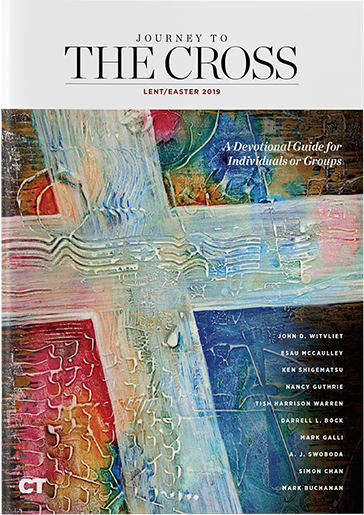“So again Pilate asked him, ‘Aren’t you going to answer? See how many things they are accusing you of’” (Mark 15:4).
When we approach Easter, there are many things we think about: Jesus’ death in our place, the disciples’ lack of understanding, God’s choice to have women be the first witnesses to the empty tomb, resurrection hope. There is a multitude of directions to go when thinking about the end of this most significant week in history.
But there is one we rarely consider: how Jesus got through that experience. Yes, we note Gethsemane where he wrestled with his coming fate and eventually handed it all over to God. But what did that mean for him? Is there anything for us to learn from how Christ faced the intense rejection by the world that the Cross represented?
During the entire second half of his ministry, Jesus taught his disciples that they would face opposition, resistance, and rejection just as he did. Their spiritual development depended upon how to cope with this reality—a reality our churches today are struggling with as we move into an increasingly post-Christian context. John O’Sullivan, former editor of the National Review, defines it this way: “A post-Christian society is not merely a society in which agnosticism or atheism is the prevailing fundamental belief. It is a society rooted in the history, culture, and practices of Christianity but in which the religious beliefs of Christianity have either been rejected or worse, forgotten.”
What can Jesus’ arrest and trial teach us about our own calling in such a world? How do we best remember what many in the world have forgotten?
Jesus was betrayed by one of his own. He was examined about his identity by the Jewish leadership. He faced Pilate with his life hanging in the balance, depending upon what he would say. The stakes were high as he stood before the Roman governor. As we contemplate Christ during his trial, what can we learn?
First, trusting the Father, Jesus did not fight back down or reflect fear in the face of the rejection. The scene with Pilate is revealing. Pilate is shocked that Jesus did not respond as he’d expect someone in Jesus’ situation would. In fact, Mark 15:5 says Pilate was amazed. Jesus’ way of engagement with opposition is not like that of the world. As bad as the circumstances were (and as grim as they looked to Peter, who denied the Lord at about the same time), Jesus knew that the call the Father had given to him included this space. No hard fight back was required.
Second, Jesus rested in the confidence of his identity. He was secure in this place. As John the Evangelist notes, Pilate was surprised when Jesus initially made no reply to the accusations against him. Then, in John 19:11, we see Jesus’ response, which is rooted in the security his identity in God provides him: “You would have no power over me if it were not given you from above.”
Earlier Jesus had told Pilate, “My kingdom is not of this world” (18:36). This previous exchange took place as they debated the nature of truth. For Jesus, God the Father and his way—connected as it is to Christ himself—was the truth, so there was no need to whine about what was happening, nor any need for rebuttal, nor any need to act out of fear. First Peter 3:14 expresses the idea this way: “But even if you should suffer for what is right, you are blessed. Do not fear their threats; do not be frightened.” Rejection will come, just as it did for the Master, but how we respond to it should reflect the path he took.
Third, we rest in the confidence that vindication and justice will come. When we face opposition, it can seem so risky to let such circumstances go, to not fight back. But Jesus’ confidence was not set in the present; he knew a day of vindication would come. This is clear in Jesus’ answer to a question the Jewish leadership had posed, asking if he was the Messiah. “I am,” said Jesus, “And you will see the Son of Man sitting at the right hand of the Mighty One coming on the clouds of heaven” (Mark 14:62). Jesus’ reply was not only an affirmation that he was the Messiah but an assertion that he would sit with the Father in heaven—a remark the Jewish leadership considered to be blasphemy (v. 64). In fact, Jesus’ claim would have been blasphemous had it not been true.
God’s vote in this dispute, blasphemy or exaltation, is really what Easter is all about. Jesus was saying, essentially, “You might do to me whatever you want, but a day is coming when the Father will vindicate me and give me my place at his side where I will be your judge.” The reality of his coming vindication gave Jesus the confidence to be faithful as he was accused and tried. Jesus did not take things into his hands because he knew the Father had his back. The Resurrection we celebrate was God’s vindication of Jesus’ claim.
There is an irony in this that should not be missed. This word from Jesus about the Son of Man seated at God’s right hand is technically what got him crucified. The religious leaders had struggled to get testimony they could take to Pilate—then Jesus supplied that testimony himself. The leadership understood the point Jesus was making, but they failed to believe it. After he was beaten and mocked, they took him to Pilate where he was crucified for sedition—for making himself a king Rome did not appoint, because Jesus’ kingdom was not of this world.
Jesus was so committed to going to the Cross for us that he provided the very words which got him crucified. He did it because he knew God would vindicate him three days later. That is how deep his love for us is.
How can we respond to resistance or rejection? Like Christ did. We trust God in the face of opposition. We rest in the identity God gives us so we need not fear that rejection and overreact. We know that in the vindication tied to Jesus we find our own restoration when all will be set right. In this is the way of the Cross.
Darrell L. Bock is executive director of cultural engagement and senior research professor of New Testament studies at Dallas Theological Seminary. He is the author of over 40 books and commentaries, including Jesus According to Scripture.

This article is part of Journey to the Cross, CT’s 2019 Lent/Easter devotional, which is available for digital download here.










